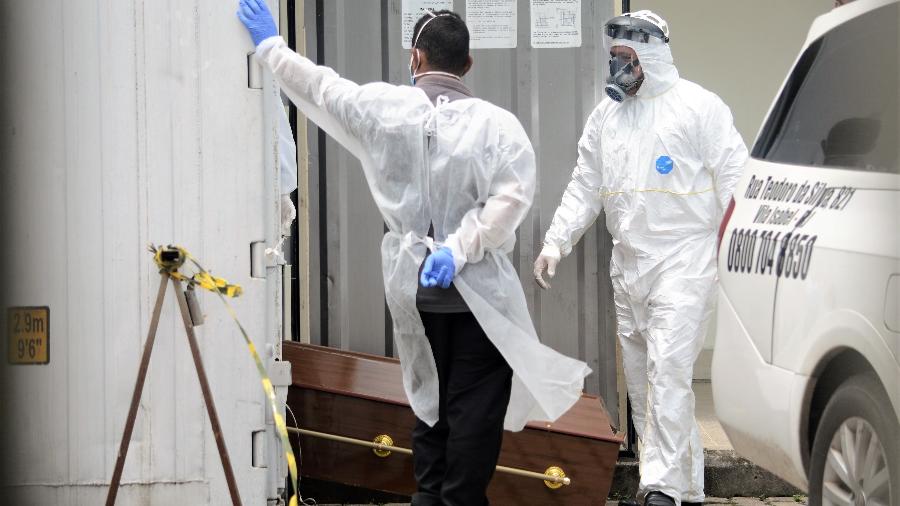RIO DE JANEIRO, BRAZIL – The state of Rio, which leads the national Covid-19 mortality rate ranking, on Wednesday, January 13th reached the highest daily average of deaths (168) since June 24th – one of the most critical months of the pandemic.
As a result, hospitals in the capital are registering full capacity of ICU beds (Intensive Care Units). The ICU bed occupancy for Covid reached 99.8% in the capital’s public health system (SUS) at the start of the year, according to Fiocruz (Oswaldo Cruz Foundation).

Experts say that Rio’s healthcare network is collapsing due to lack of beds, with waiting lines for hospitalization and increased demand for primary care. For infectologists, restrictive measures imposed by authorities in Rio are insufficient.
The alarm had already been sounded last month, when patients died with no access to the ICU. Such is the case of the patient Cleber Fabrício, 67, who despite legal action failed to be transferred to an intensive care bed and died of Covid after 12 days in the CER (Regional Emergency Center) of Barra da Tijuca, in the west zone.
“He was in a very critical condition in the CER’s red room. I went to court so he would be moved to an ICU, but we failed. At the hospital they only said that there was no room. It was horrible, we couldn’t even say goodbye,” said Sidineia Oliveira, caretaker.
For Alexandre Telles, president of the Rio de Janeiro Doctors Union, “it was a wrong decision to decommission the Riocentro Field Hospital with no adequate planning and without having previously arranged beds with the private sector”.
The City Hall is considering renting beds in the private network, but a decision has not yet been announced. Figures from the Rio de Janeiro State Hospitals Association also reveal private network capacity – the ICU bed occupancy rate for Covid currently stands at 98% in the capital and at 78% in the state.
“We are analyzing some private institutions that have proposed to offer beds and we should have these institutions accredited to offer beds in the first or second week of February,” said Municipal Health Secretary Daniel Soranz.
For Fiocruz, the high mortality rate (157.8 deaths per 100,000 inhabitants) is a reflection of critical flaws in the healthcare and surveillance system. Among them, the lack of qualified professionals to meet the demand. “Emergencies are crowded and people are starting to die at home. It is a cascading effect. This is a risk we are experiencing now. There is an urgent need to open new intensive care beds and then we face yet another problem, because even if we open new beds, we won’t have enough staff,” said Márcio Nehab, a physician from the Brazilian Society of Infectology and Fiocruz.
Senior researcher at Fiocruz Margareth Portela says it is as if Rio has gone back in time. “We have a pattern of cases approaching what we had in July and August and deaths more or less like in May. Many hospitals are struggling to hire specialized ICU staff”.
Experts demand tougher measures
Mayor Eduardo Paes announced this week a plan with measures to be implemented by regions of the capital according to a classification in three risk levels (moderate, high and very high). Among them, is the operation subject to restrictions of bars, restaurants, gyms, cinemas and theaters despite the “very high risk” situation. The Mayor called for compliance with the restrictions, even argued that “nightclubs in which people do not have to dance is possible” and said that “the city will not be able to supervise every single citizen.”
For Telles, “with the collapse of the [health] network, the city government adopted a resolution that does not impose isolation and social distancing satisfactorily. Infectologist Alberto Chebabo also advocates that isolation be more strict” particularly with respect to activities considered non-essential such as concert halls, bars and restaurants after a certain time. Despite revoking the authorization for soccer stadiums, the mere fact that the City Hall considered reopening stadiums to the public sparked an alert.
“The stadium issue is unjustified, stadiums are venues where there is a large concentration of people. It’s not an activity that should be considered for public access at this time,” said infectologist Alberto Chebabo.

